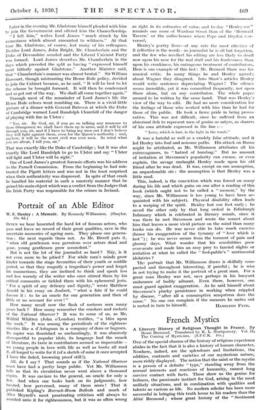Portrait of an Able Editor
W. E. Henley : A Memoir. By Kennedy Williamson. (Shaylor. Its. 6d.)
Ormx we hear lamented the hard lot of famous actors, who pass and leave no record of their great qualities, save in the uncertain memories of ageing men. They please one genera- tion; the next regards them not. As Mr. Birrell puts it, "when old gentlemen wax garrulous over actors dead and gone, young gentlemen grow somnolent."
But is not the lot of the journalist as hard ? Ntiy, is it not even more to be pitied ? For while men's minds grow kinder towards the stage favourites of their youth or middle period, so that they magnify a tragedian's power and forget his mannerisms, they are inclined to think and speak less and less warmly of the writer who once stirred them by his critical comments or tickled them with his ephemeral jests. " For a spirit of any delicacy and dignity," wrote Matthew Arnold in his essay on Joubert, "what a fate if he could foresee it : to be an oracle for one generation and then of little or no account for ever ! "
How many recall now the flash of meteors seen many years back ? How many remember the crackers and rockets of the National Observer? It was to some of us, as Mr. Wilfrid Whitten (John o'London) testifies, "a bliss upon the week." It was among the periodicals of the eighteen- nineties like a d'Artagnan in a company of dons or bagmen. Its rapier was flourished so enchantingly, it was abusively disrespectful to popular idols, its language had the smack of literature, its taste in contributors seemed so impeccable— we young people in love with life as well as books all read it, all longed to write for it (of a sketch of mine it once accepted I have the faded, browning proof still !).
All, do I say ? That sounds as if the National Observer must have had a pretty large public. Yet Mr. Williamson tells us that its circulation never went above a thousand copies. It was caviare to the general, an oracle for only a few. And when one looks back on its judgments, how twisted, how perversed, many of them seem ! That it published Kipling's Barrack-Room Ballads and much of Alice Meynell's most penetrating criticism will always be counted unto it for righteousness, but it was as often wrong as right in its estimates of value, and to-day " Ilenley-ese" reminds one more of Wardour Street than of the 'Mermaid Tavern' or the coffee-houses where Pope and Dryden con- versed.
Henley's poetry lives—at any nite the most effective of it (effective is the word)—as journalist he is all but forgotten. and the few who recollect his editing are less likely to dwell now upon his nose for the real stuff and his fearlessness than upon his crankiness, his outrageous treatment of contributors. Here is one example of this last : Mr. Bernard Shaw was his musical critic. In ninny things he and Henley agreed ; about Wagner they disagreed. Into Shaw's articles Henley would write sentences depreciating Wagner ! The offence seems incredible, yet it was committed frequently, not upon Shaw alone, but on any contributor. The whole paper seemed to be written by the same hand. That was Henley's view of the way to edit. He had no more consideration for the feelings of those who worked with him than he had for those of the public. He took a fierce pride in being provo- cative. This was not difficult, since he suffered from an abnormal itch to represent men of genius as satyrs, as sharers of his own attitude expressed in the line :— " Love, which is lust, is the light in the tomb."
It was a hateful as well as a crudely false attitude, and it led Henley into foul and noisome paths. His attack on Burns might be attributed, as Mr. Williamson attributes all his extravagances, to "hatred of humbug." But no amount of irritation at Stevenson's popularity can excuse, or even explain, the savage • onslaught Henley made upon his old friend after he was dead. It was, except on one assumption, an unpardonable sin : the assumption is that Henley was a little mad.
This, indeed, is the conviction which was forced on many during his life and which gains on one after a reading of this book (which ought not to be called a "memoir," by the way, since Mr. Williamson is too young to have been ac- quainted with his subject). Physical disability often leads to a warping of the spirit. Henley lost one foot early ; he saved the other only by that long ordeal in Edinburgh Infirmary which is celebrated in literary annals, since it was there he met Stevenson and wrote the sonnet about him that leaves a more vivid picture on the mind than many books can do. He was never able to take much exercise (hence his exaggeration of the tyranny of "love which is lust ") ; he was never secure from the torment of pain and gloomy days. What wonder that his sensibilities grew over-acute and made him an easy prey to fancied slights or irritation at what he called the " fool-public's" sentimental idolatries ?
Tho portrait that Mr. Williamson draws is skilfully com- pacted and throughout interesting, if painful ; he is wise in not trying to make it the portrait of a great man. For a great man Henley was not, save perhaps in his buoyant endurance of bodily ailment. Even there, however, one must -guard against exaggeration. As he said himself about Stevenson's plucky persistence in working when crippled by disease, "after all a consumptive sempstress does the same." No one can complain if the measure he metes out




















































 Previous page
Previous page